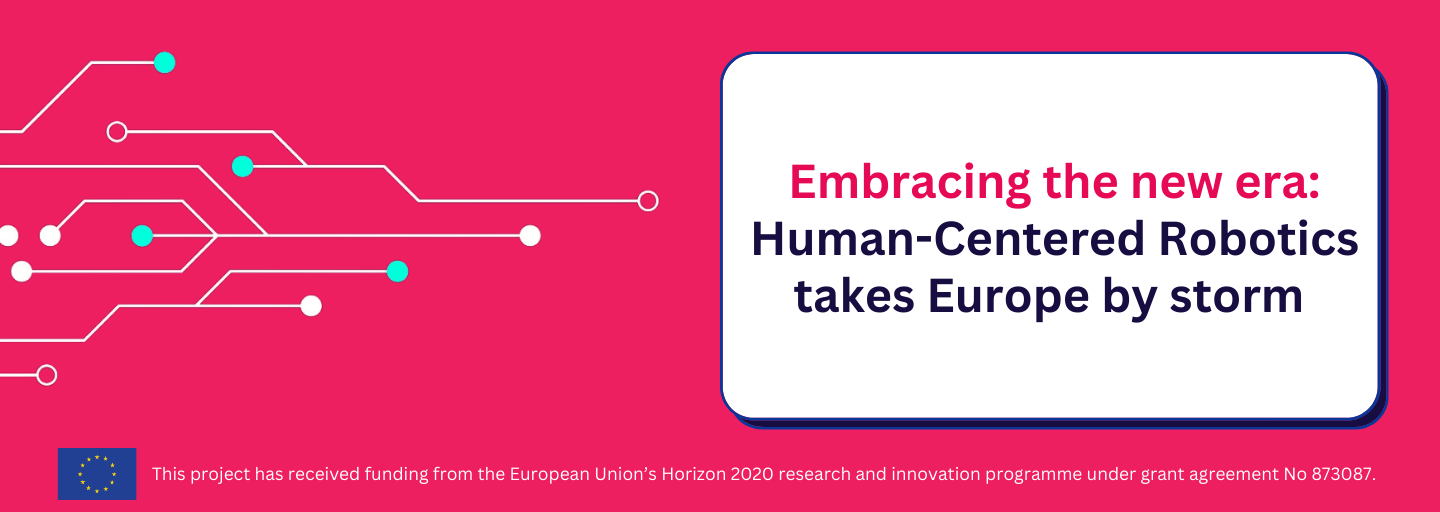European projects SHOP4CF, Change2Twin, Better Factory, Amulet and Circuloos are feeding the unstoppable storm in which Europe has been involved in recent years. Those projects constitute a true game changer in the manufacturing industry.
Human-Centered Robotics: Living the digital wave of sustainable innovation
Picture yourself stepping into a cutting-edge European smart factory, and your eyes get immediately caught by the different types of robots that seem to control the entire factory. These autonomous machines seamlessly navigate their daily tasks, allowing human workers to focus on high-value activities. What’s truly remarkable is the harmonious collaboration between these robots and humans, working together in a nearly symbiotic manner. The machine does not replace the human but complements her/his capabilities and relieves him of arduous tasks. The Cobots or Collaborative Robots can directly and safely interact with humans in a shared workspace. The Cobots are just one example of how the European Commission has invested substantial funding to get Europe into a leading position in digitalization and robotics over the past several years. It is important to highlight that Europe is presently a global leader in the supply of Industry 4.0 technology, as well as a leader in its implementation. (European Parliament, 2023740259_EN.pdf)).
SHOP4CF, Change2Twin, and Better Factory: the projects that made Europe a human centered robotics hub
Specific European funds have championed many projects to allow SMEs and startups to be pioneers in transformation and adopt the most innovative technologies available on the market. The hot topic in the manufacturing sector, automation in the digital era, gives a new twist to the old factory version. Can’t you see industrial applications seamlessly revolve around humanity? Welcome to the world of SHOP4CF, the Smart Human Oriented Platform for Connected Factories. SHOP4CF firmly believes that automation shouldn’t evict human ingenuity from processes. Technology here takes on a distinctly human-centric form. The grand objective? Finding the perfect balance where the automation of repetitive tasks is both efficient and affordable while also harnessing the innate strengths of the human workforce: Adaptability, creativity, and agility. These qualities still set us apart from the robotic world. In a sector where change is the only constant, SHOP4CF is a game-changer, introducing a human-centric paradigm that assures workers that automation won’t supplant them but, more importantly, will empower them profoundly and definitively.
Technologies in Industry 4.0 seem taken out of the science fiction universe. Have you ever even thought about literary duplicating something in the digital world and making it so accurate that you could test it and identify when it fails? It’s like you can predict the future of machines. Digital twins are transformative catalysts within the manufacturing sector, enabling companies to enhance their global competitive edge markedly. A digital twin represents a meticulously accurate digital counterpart of a physical object, process, or service, with precision to serve as a decision-making foundation. This digital replica is intricately linked to the physical realm through continuous data streams. Change2Twin is one example of making digital twins available to European manufacturers. The project extends a tailored solution to manufacturing SMEs, encompassing a comprehensive assessment of their potential, crafting a personalized mentoring plan, and delivering a ready-to-deploy blueprint for digital twin implementation.
Better Factory, another European-funded project, made its claim crystal clear: Grow your manufacturing business. The consortium members focus on merging the tangible industry with the intangible world of cyber-physical systems, empowering the potential for crafting novel, personalized products with a human touch. Better Factory aims to forge a network, an artistic alliance of creators, and a legion of small and medium-sized manufacturing enterprises (SMEs). The artists explore the knowledge residing within these SMEs. Their mission is to guide these enterprises, helping them diversify their product offerings and ensuring they align seamlessly with the evolving market demands.
Circular economy, the second wave of innovation, is already on track with AMULET and CIRCULOOS.
What if Circular manufacturing was the next significant shift in the sector? Europe, as always avant-garde, had already thought about it, giving universities, SMEs and technological providers the power to explore that field. Small and medium-sized enterprises (SMEs) are yet to harness the full potential of the marvels that advanced lightweight materials offer, both in science and technology. With its audacious mission to revolutionize the landscape, AMULET project wants to usher in the era of advanced lightweight materials by fomenting a veritable whirlwind of knowledge exchange that transcends regions and industries. Name the transformation tools: Polymer matrix composites, ceramic matrix composites, and light metal alloys. AMULET encourages these resourceful enterprises to identify novel value chains for these advanced lightweight materials.
For MSMEs and SMEs, the path to a circular economy is filled with transformative opportunities, and CIRCULOOS serves as a guide on this journey. The project is all about orchestrating and optimizing the entire supply chain, end to end. It leaves no stone unturned in addressing the complete life cycle of products. CIRCULOOS is all about empowerment, making MSMEs sustainable, agile, and resilient through its RAMP initiative for Manufacturing SMEs. It leverages intelligent modules for production intelligence, sustainability assessments, and the secure sharing of data. It’s an ecosystem where MSMEs discover their circular potential and chart a sustainable future.
Join the Smart Manufacturing Community and check those projects by yourself!

